Compensation and Benefit of Employees Assignment - University
VerifiedAdded on 2022/10/10
|6
|994
|147
Homework Assignment
AI Summary
This homework assignment addresses key aspects of employee compensation and benefits, covering topics such as the Fair Labor Standards Act (FLSA), employee medical leave under the Family and Medical Leave Act (FMLA) and Pregnancy Discrimination Act, and ethical HR practices in recruitment. The solution provides detailed descriptions, definitions, and explanations of relevant laws and regulations. It includes responses to descriptive questions about FLSA, medical leave, and compliance with employment laws, as well as answers to multiple-choice questions related to compensation and benefits. The assignment emphasizes the importance of adhering to legal and ethical standards in human resources management, particularly in areas like minimum wage, overtime pay, child labor, and non-discrimination during the hiring process. The document aims to provide a comprehensive understanding of compensation and benefits principles and their practical application in a workplace setting.
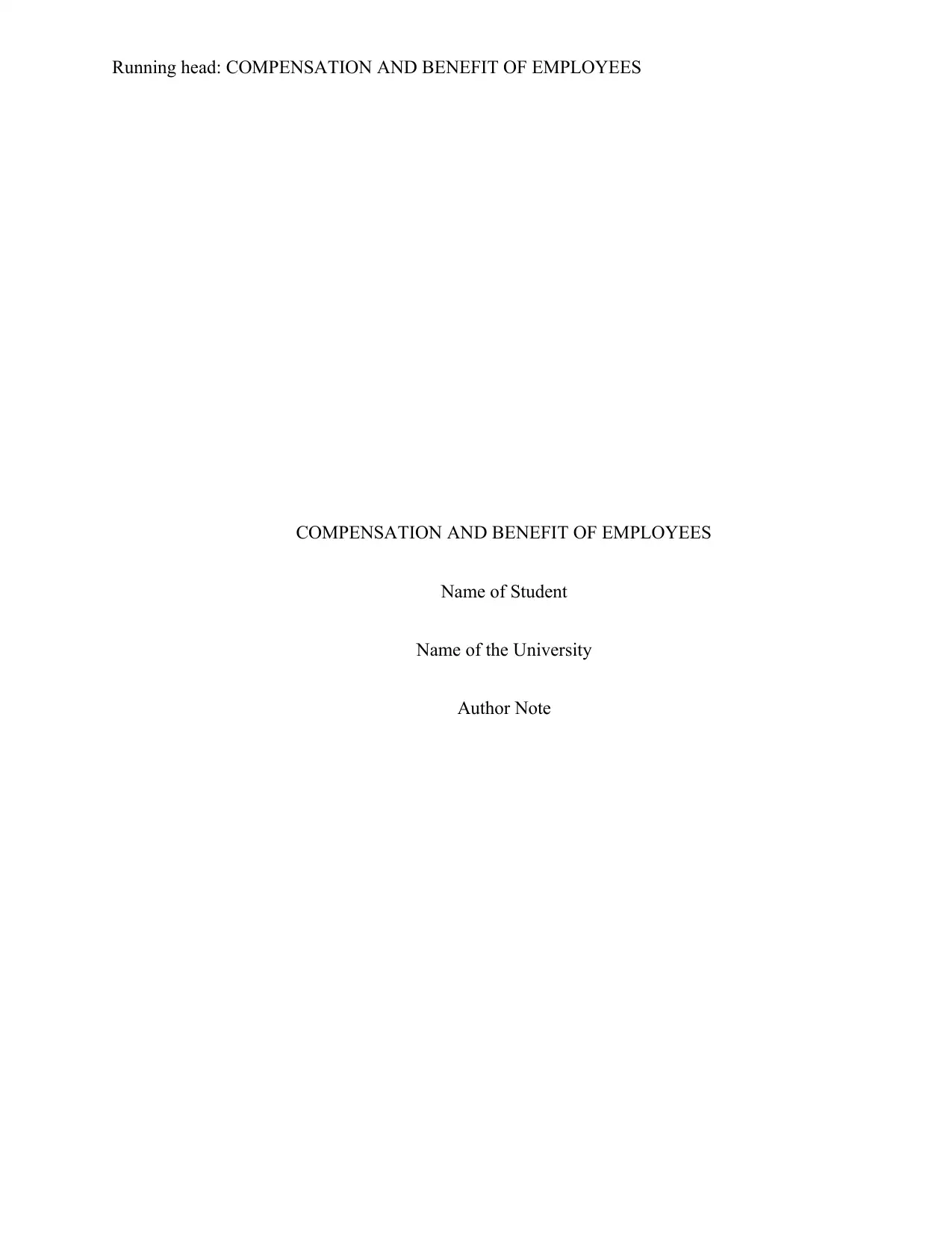
Running head: COMPENSATION AND BENEFIT OF EMPLOYEES
COMPENSATION AND BENEFIT OF EMPLOYEES
Name of Student
Name of the University
Author Note
COMPENSATION AND BENEFIT OF EMPLOYEES
Name of Student
Name of the University
Author Note
Paraphrase This Document
Need a fresh take? Get an instant paraphrase of this document with our AI Paraphraser
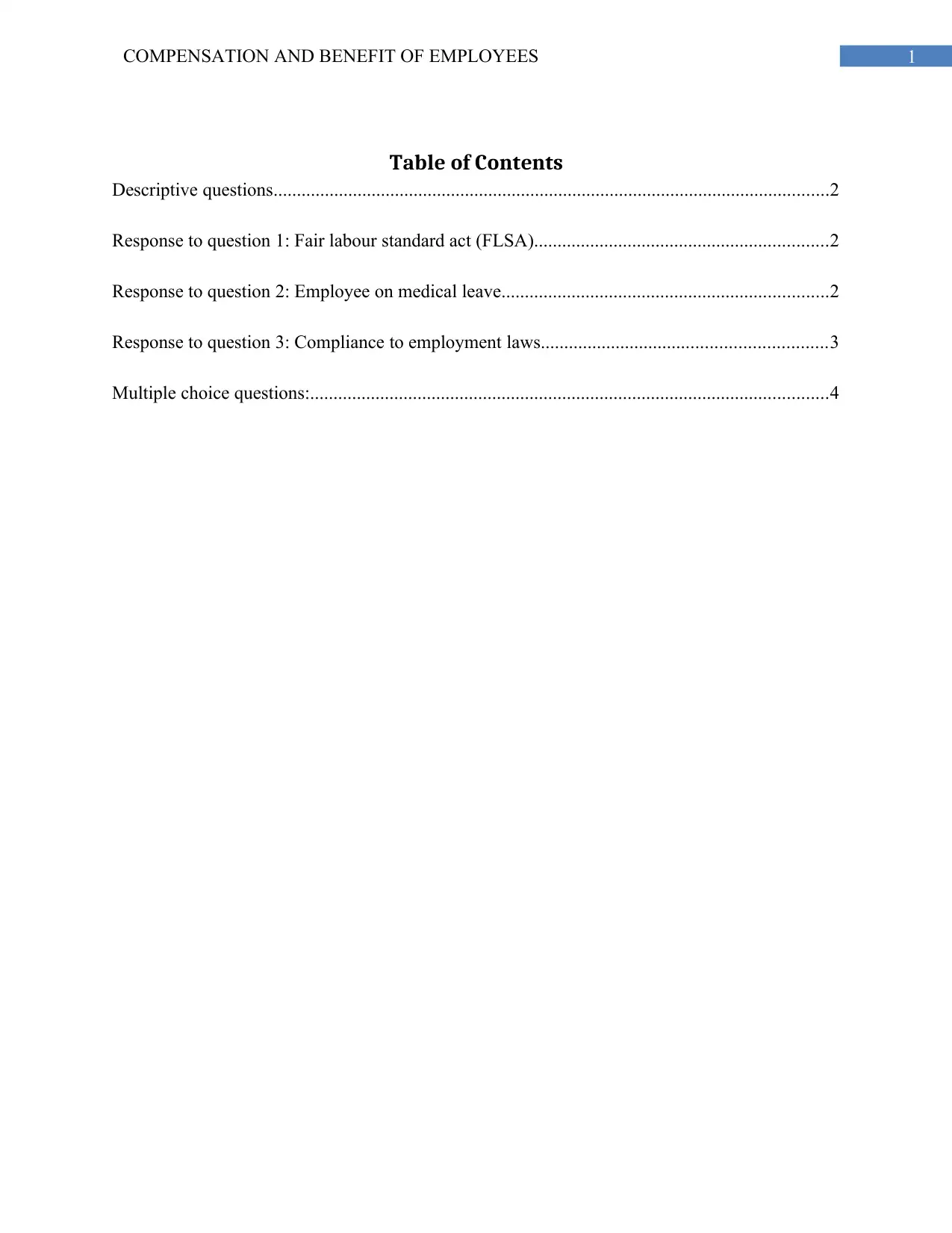
1COMPENSATION AND BENEFIT OF EMPLOYEES
Table of Contents
Descriptive questions.......................................................................................................................2
Response to question 1: Fair labour standard act (FLSA)...............................................................2
Response to question 2: Employee on medical leave......................................................................2
Response to question 3: Compliance to employment laws.............................................................3
Multiple choice questions:...............................................................................................................4
Table of Contents
Descriptive questions.......................................................................................................................2
Response to question 1: Fair labour standard act (FLSA)...............................................................2
Response to question 2: Employee on medical leave......................................................................2
Response to question 3: Compliance to employment laws.............................................................3
Multiple choice questions:...............................................................................................................4
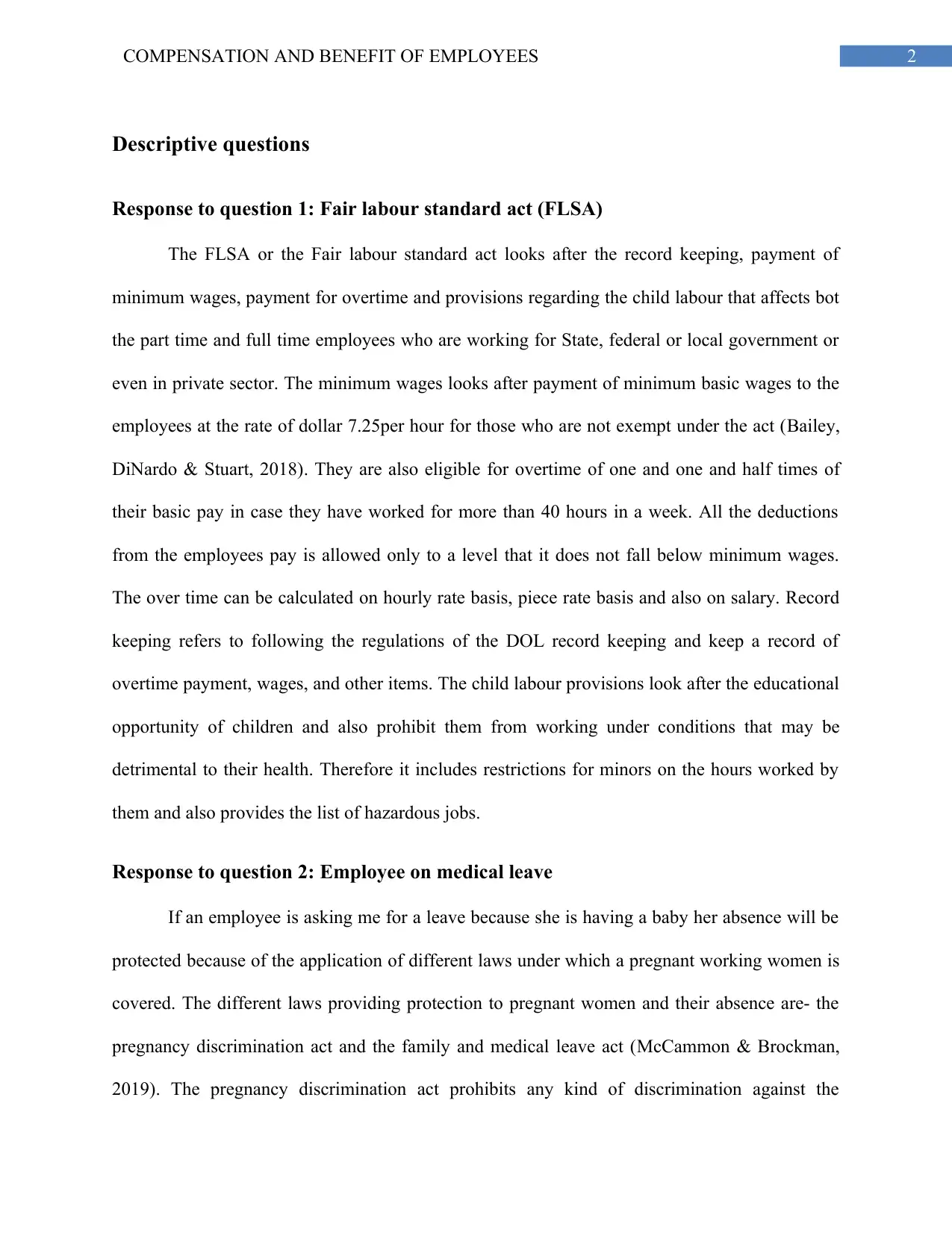
2COMPENSATION AND BENEFIT OF EMPLOYEES
Descriptive questions
Response to question 1: Fair labour standard act (FLSA)
The FLSA or the Fair labour standard act looks after the record keeping, payment of
minimum wages, payment for overtime and provisions regarding the child labour that affects bot
the part time and full time employees who are working for State, federal or local government or
even in private sector. The minimum wages looks after payment of minimum basic wages to the
employees at the rate of dollar 7.25per hour for those who are not exempt under the act (Bailey,
DiNardo & Stuart, 2018). They are also eligible for overtime of one and one and half times of
their basic pay in case they have worked for more than 40 hours in a week. All the deductions
from the employees pay is allowed only to a level that it does not fall below minimum wages.
The over time can be calculated on hourly rate basis, piece rate basis and also on salary. Record
keeping refers to following the regulations of the DOL record keeping and keep a record of
overtime payment, wages, and other items. The child labour provisions look after the educational
opportunity of children and also prohibit them from working under conditions that may be
detrimental to their health. Therefore it includes restrictions for minors on the hours worked by
them and also provides the list of hazardous jobs.
Response to question 2: Employee on medical leave
If an employee is asking me for a leave because she is having a baby her absence will be
protected because of the application of different laws under which a pregnant working women is
covered. The different laws providing protection to pregnant women and their absence are- the
pregnancy discrimination act and the family and medical leave act (McCammon & Brockman,
2019). The pregnancy discrimination act prohibits any kind of discrimination against the
Descriptive questions
Response to question 1: Fair labour standard act (FLSA)
The FLSA or the Fair labour standard act looks after the record keeping, payment of
minimum wages, payment for overtime and provisions regarding the child labour that affects bot
the part time and full time employees who are working for State, federal or local government or
even in private sector. The minimum wages looks after payment of minimum basic wages to the
employees at the rate of dollar 7.25per hour for those who are not exempt under the act (Bailey,
DiNardo & Stuart, 2018). They are also eligible for overtime of one and one and half times of
their basic pay in case they have worked for more than 40 hours in a week. All the deductions
from the employees pay is allowed only to a level that it does not fall below minimum wages.
The over time can be calculated on hourly rate basis, piece rate basis and also on salary. Record
keeping refers to following the regulations of the DOL record keeping and keep a record of
overtime payment, wages, and other items. The child labour provisions look after the educational
opportunity of children and also prohibit them from working under conditions that may be
detrimental to their health. Therefore it includes restrictions for minors on the hours worked by
them and also provides the list of hazardous jobs.
Response to question 2: Employee on medical leave
If an employee is asking me for a leave because she is having a baby her absence will be
protected because of the application of different laws under which a pregnant working women is
covered. The different laws providing protection to pregnant women and their absence are- the
pregnancy discrimination act and the family and medical leave act (McCammon & Brockman,
2019). The pregnancy discrimination act prohibits any kind of discrimination against the
⊘ This is a preview!⊘
Do you want full access?
Subscribe today to unlock all pages.

Trusted by 1+ million students worldwide
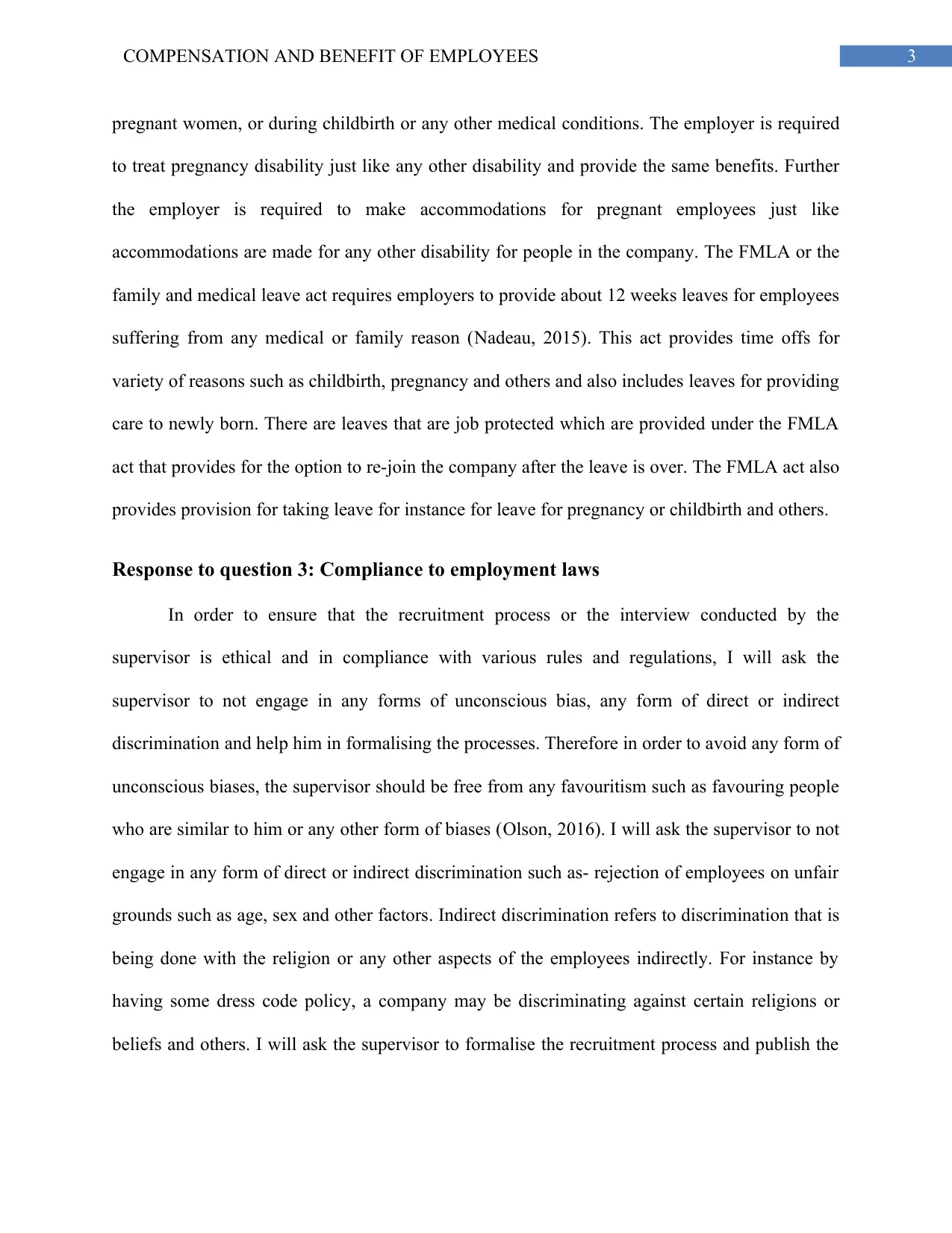
3COMPENSATION AND BENEFIT OF EMPLOYEES
pregnant women, or during childbirth or any other medical conditions. The employer is required
to treat pregnancy disability just like any other disability and provide the same benefits. Further
the employer is required to make accommodations for pregnant employees just like
accommodations are made for any other disability for people in the company. The FMLA or the
family and medical leave act requires employers to provide about 12 weeks leaves for employees
suffering from any medical or family reason (Nadeau, 2015). This act provides time offs for
variety of reasons such as childbirth, pregnancy and others and also includes leaves for providing
care to newly born. There are leaves that are job protected which are provided under the FMLA
act that provides for the option to re-join the company after the leave is over. The FMLA act also
provides provision for taking leave for instance for leave for pregnancy or childbirth and others.
Response to question 3: Compliance to employment laws
In order to ensure that the recruitment process or the interview conducted by the
supervisor is ethical and in compliance with various rules and regulations, I will ask the
supervisor to not engage in any forms of unconscious bias, any form of direct or indirect
discrimination and help him in formalising the processes. Therefore in order to avoid any form of
unconscious biases, the supervisor should be free from any favouritism such as favouring people
who are similar to him or any other form of biases (Olson, 2016). I will ask the supervisor to not
engage in any form of direct or indirect discrimination such as- rejection of employees on unfair
grounds such as age, sex and other factors. Indirect discrimination refers to discrimination that is
being done with the religion or any other aspects of the employees indirectly. For instance by
having some dress code policy, a company may be discriminating against certain religions or
beliefs and others. I will ask the supervisor to formalise the recruitment process and publish the
pregnant women, or during childbirth or any other medical conditions. The employer is required
to treat pregnancy disability just like any other disability and provide the same benefits. Further
the employer is required to make accommodations for pregnant employees just like
accommodations are made for any other disability for people in the company. The FMLA or the
family and medical leave act requires employers to provide about 12 weeks leaves for employees
suffering from any medical or family reason (Nadeau, 2015). This act provides time offs for
variety of reasons such as childbirth, pregnancy and others and also includes leaves for providing
care to newly born. There are leaves that are job protected which are provided under the FMLA
act that provides for the option to re-join the company after the leave is over. The FMLA act also
provides provision for taking leave for instance for leave for pregnancy or childbirth and others.
Response to question 3: Compliance to employment laws
In order to ensure that the recruitment process or the interview conducted by the
supervisor is ethical and in compliance with various rules and regulations, I will ask the
supervisor to not engage in any forms of unconscious bias, any form of direct or indirect
discrimination and help him in formalising the processes. Therefore in order to avoid any form of
unconscious biases, the supervisor should be free from any favouritism such as favouring people
who are similar to him or any other form of biases (Olson, 2016). I will ask the supervisor to not
engage in any form of direct or indirect discrimination such as- rejection of employees on unfair
grounds such as age, sex and other factors. Indirect discrimination refers to discrimination that is
being done with the religion or any other aspects of the employees indirectly. For instance by
having some dress code policy, a company may be discriminating against certain religions or
beliefs and others. I will ask the supervisor to formalise the recruitment process and publish the
Paraphrase This Document
Need a fresh take? Get an instant paraphrase of this document with our AI Paraphraser
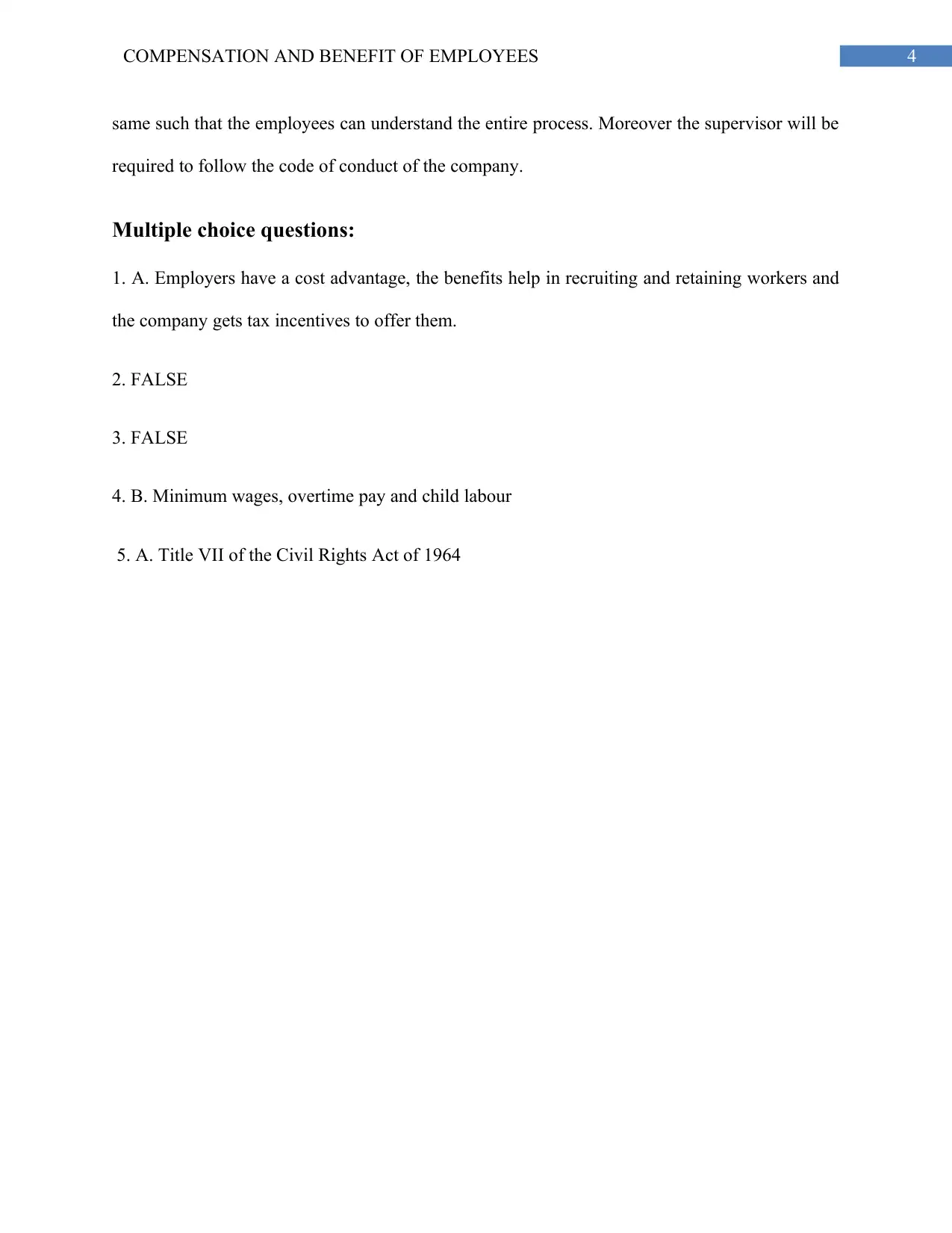
4COMPENSATION AND BENEFIT OF EMPLOYEES
same such that the employees can understand the entire process. Moreover the supervisor will be
required to follow the code of conduct of the company.
Multiple choice questions:
1. A. Employers have a cost advantage, the benefits help in recruiting and retaining workers and
the company gets tax incentives to offer them.
2. FALSE
3. FALSE
4. B. Minimum wages, overtime pay and child labour
5. A. Title VII of the Civil Rights Act of 1964
same such that the employees can understand the entire process. Moreover the supervisor will be
required to follow the code of conduct of the company.
Multiple choice questions:
1. A. Employers have a cost advantage, the benefits help in recruiting and retaining workers and
the company gets tax incentives to offer them.
2. FALSE
3. FALSE
4. B. Minimum wages, overtime pay and child labour
5. A. Title VII of the Civil Rights Act of 1964
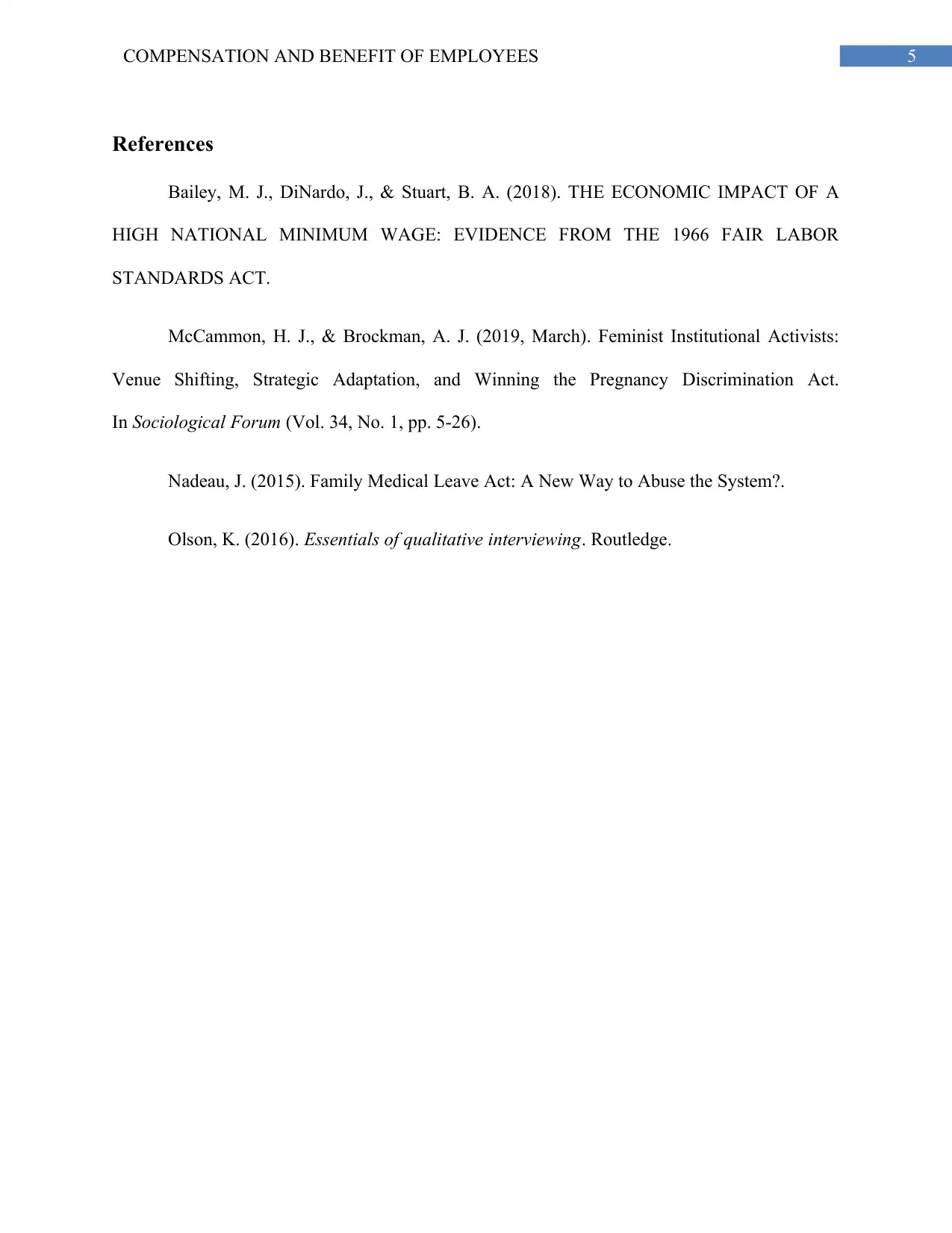
5COMPENSATION AND BENEFIT OF EMPLOYEES
References
Bailey, M. J., DiNardo, J., & Stuart, B. A. (2018). THE ECONOMIC IMPACT OF A
HIGH NATIONAL MINIMUM WAGE: EVIDENCE FROM THE 1966 FAIR LABOR
STANDARDS ACT.
McCammon, H. J., & Brockman, A. J. (2019, March). Feminist Institutional Activists:
Venue Shifting, Strategic Adaptation, and Winning the Pregnancy Discrimination Act.
In Sociological Forum (Vol. 34, No. 1, pp. 5-26).
Nadeau, J. (2015). Family Medical Leave Act: A New Way to Abuse the System?.
Olson, K. (2016). Essentials of qualitative interviewing. Routledge.
References
Bailey, M. J., DiNardo, J., & Stuart, B. A. (2018). THE ECONOMIC IMPACT OF A
HIGH NATIONAL MINIMUM WAGE: EVIDENCE FROM THE 1966 FAIR LABOR
STANDARDS ACT.
McCammon, H. J., & Brockman, A. J. (2019, March). Feminist Institutional Activists:
Venue Shifting, Strategic Adaptation, and Winning the Pregnancy Discrimination Act.
In Sociological Forum (Vol. 34, No. 1, pp. 5-26).
Nadeau, J. (2015). Family Medical Leave Act: A New Way to Abuse the System?.
Olson, K. (2016). Essentials of qualitative interviewing. Routledge.
⊘ This is a preview!⊘
Do you want full access?
Subscribe today to unlock all pages.

Trusted by 1+ million students worldwide
1 out of 6
Related Documents
Your All-in-One AI-Powered Toolkit for Academic Success.
+13062052269
info@desklib.com
Available 24*7 on WhatsApp / Email
![[object Object]](/_next/static/media/star-bottom.7253800d.svg)
Unlock your academic potential
Copyright © 2020–2026 A2Z Services. All Rights Reserved. Developed and managed by ZUCOL.





